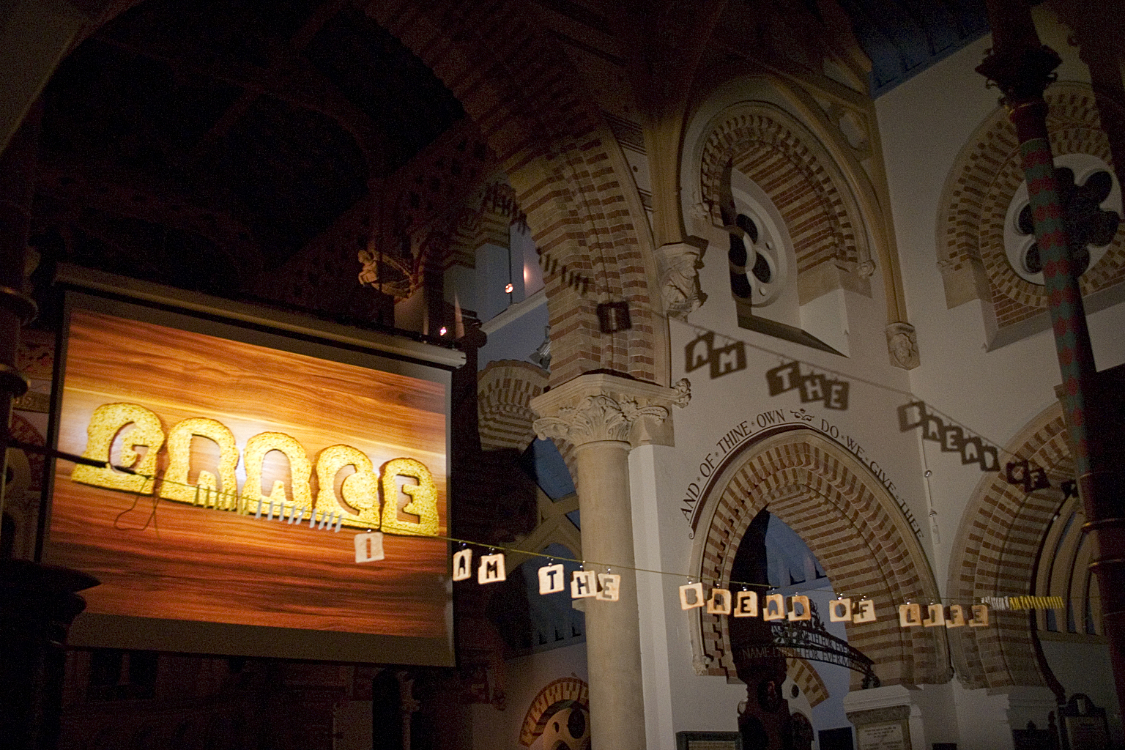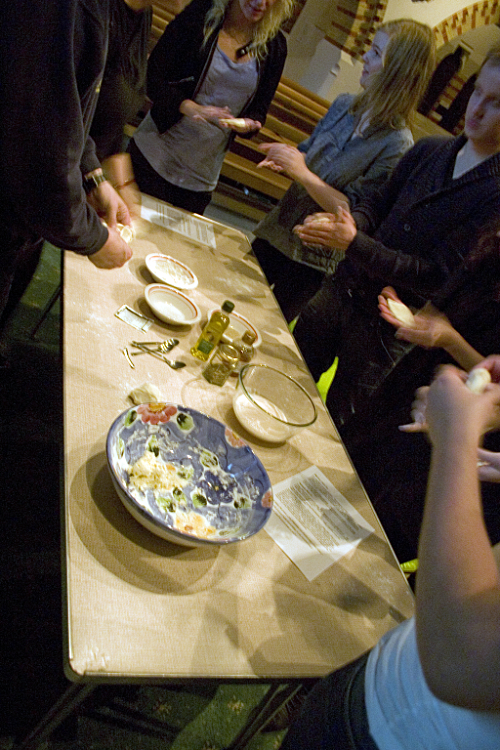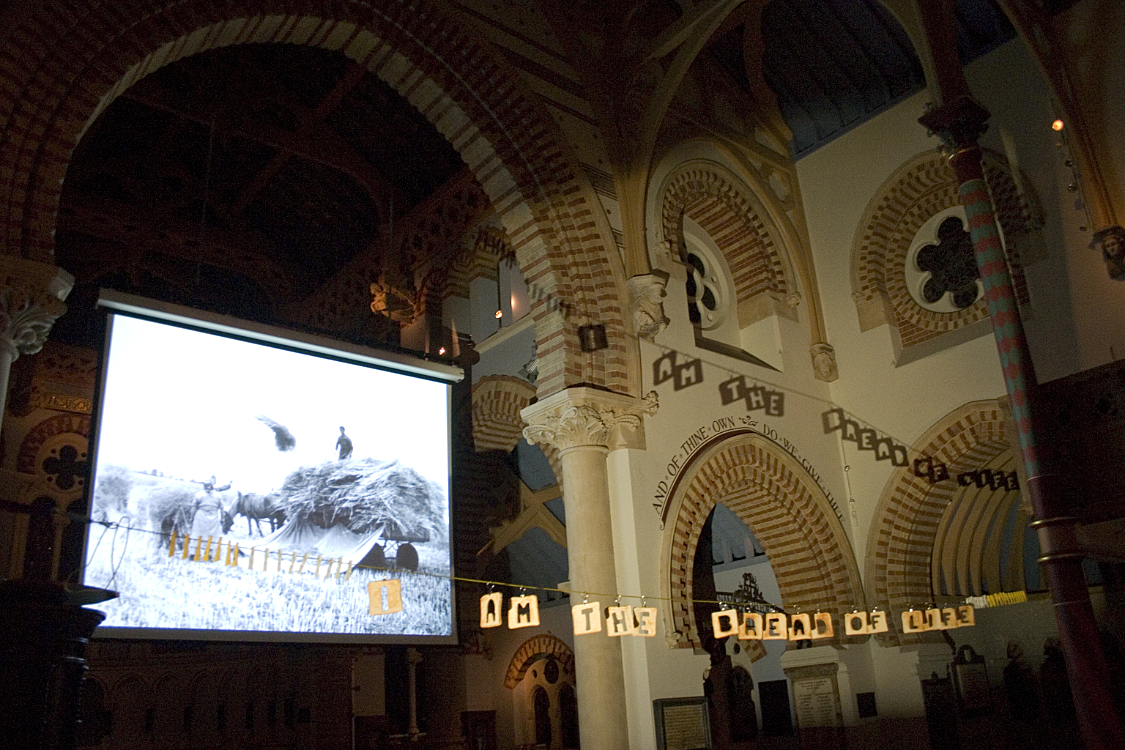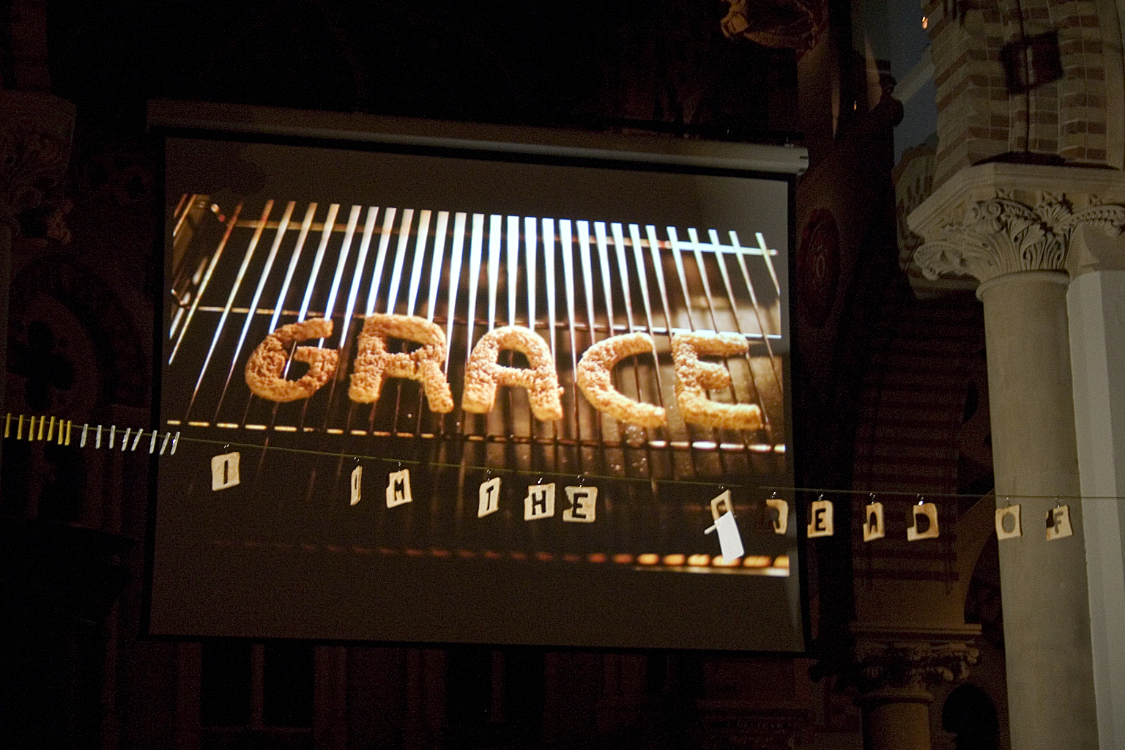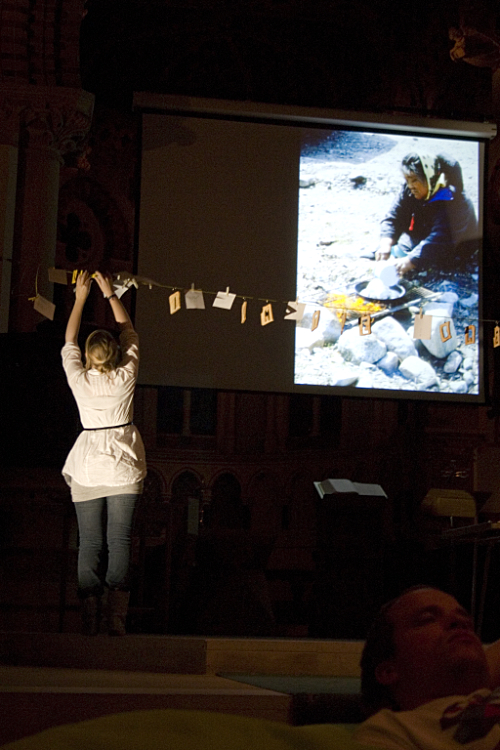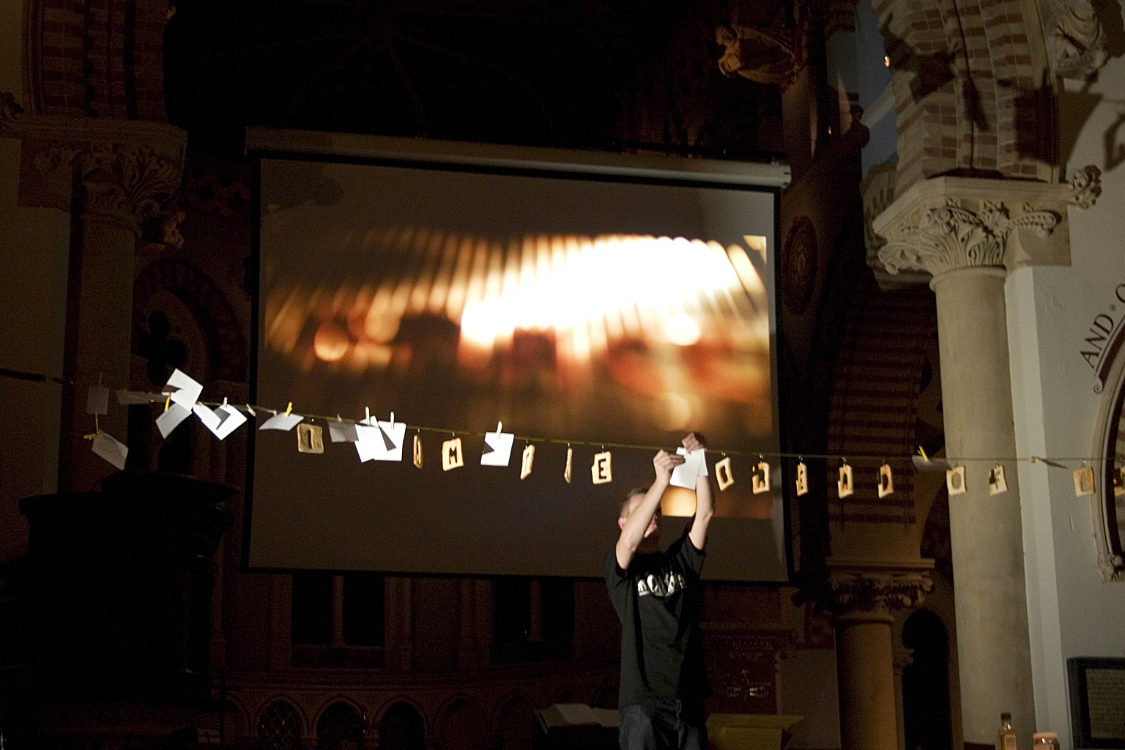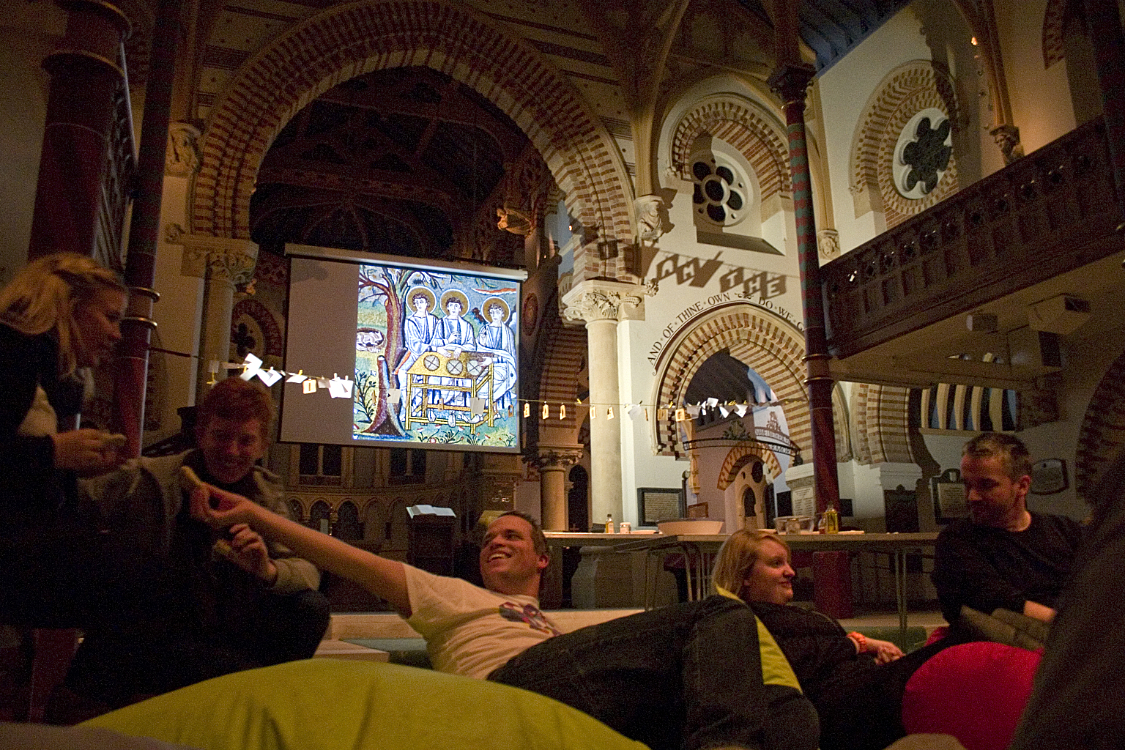October 2009: Bread
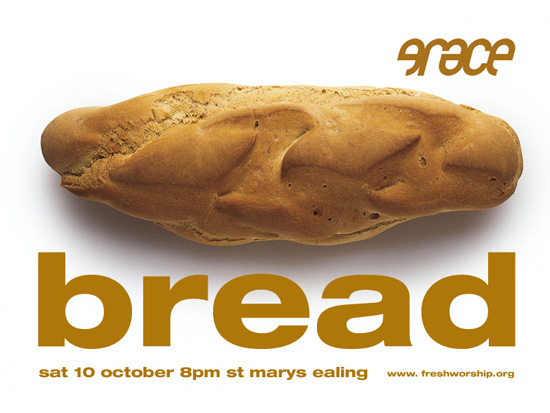
Our Toast Washing Line with "I am the Bread of Life" in alphabet-cut toast:
Bread is a fundamental staple in the west. Other cultures have rice or potatoes; we have bread. There is a story from the aftermath of World War II, when thousands of children were orphaned in bombing raids and left to starve. The fortunate ones were rescued and placed in refugee camps where they received food and good care. But many of these children could not sleep at night. They feared waking up to find themselves once again homeless and without food. Nothing seemed to reassure them. Finally, someone hit on the idea of giving each child a piece of bread to hold at bedtime. Holding their bread, each child could finally sleep in peace. All through the night the bread reminded them; "Today I ate, and I will eat again tomorrow".
Opening Prayer:
Look at us, Lord,
Our hands are empty,
Our hearts are hungry
What do we want?
We are hungry for you, God our maker
We are hungry for a world where people are loved and affirmed
We are hungry for you Holy Spirit
We are hungry for justice
We are hungry for community
We are hungry for celebration
We are hungry for you Jesus Christ
We are hungry for change
The participants were invited to gather around tables in small groups.
We demonstrated how to create a yeast fermentation using warm water, sugar, and dried yeast. We had a new packet of yeast to demonstrate the yeast of the Kingdom of God, and a packet of out-of-date yeast to demonstrate the leaven of the Pharisees and Sadducees (this we also sabotaged with vinegar).
Each group had a jug of warm water, sugar, and dried yeast to start a fermentation with(the first stage in making bread). Whilst the yeast came out of dormancy and started making froth, the people in their small groups had two readings from Matthew to read and to discuss:
Readings and Questions:
Matthew 13v31-33
He told them another parable: "The kingdom of heaven is like a mustard seed, which a man took and planted in his field. Though it is the smallest of all your seeds, yet when it grows, it is the largest of garden plants and becomes a tree, so that the birds of the air come and perch in its branches."
He told them still another parable: "The kingdom of heaven is like yeast that a woman took and mixed into a large amount of flour until it worked all through the dough."
Matthew 16v5-12
When they went across the lake, the disciples forgot to take bread. "Be careful," Jesus said to them. "Be on your guard against the yeast of the Pharisees and Sadducees." They discussed this among themselves and said, "It is because we didn't bring any bread."
Aware of their discussion, Jesus asked, "You of little faith, why are you talking among yourselves about having no bread? Don't you remember the five loaves for the five thousand, and how many basketfuls you gathered? Or the seven loaves for the four thousand, and how many basketfuls you gathered? How is it you don't understand that I was not talking to you about bread? But be on your guard against the yeast of the Pharisees and Sadducees." Then they understood that he was not telling them to guard against the yeast used in bread, but against the teaching of the Pharisees and Sadducees.
Questions.
What does 'the yeast of the Pharisees and Sadducees' mean today?
Is there any point in being 'good yeast' in our communities?
Where do you see the good yeast at work?
Then we compared the Yeast of the Kingdom of God (fluffy) with the Yeast of the Pharisees and Sadducees (flat and sour).
Before the service we had prepared some dough, kneaded it, and allowed it to have its first rising. A small lump of this dough was now distributed to every person; they were invited to knead it, to shape it into a flatbread / pizza-type shape, and to flavour it with olive oil, honey, sesame seeds, lemon salt, zatar (herbs), or fried onion. These flavourings can be taken to symbolise the diversity of the Christian community: honey for sweetness, the salt of the earth, oil for healing, herbs and onion for flavour, and seeds for new life.
The work was blessed:
Blessing the Kneading:
As this yeast does its work,
So may the Holy Spirit infiltrate all of my life:
Those areas off-limits that I want to control.
Expand my experience,
Raise my expectations.
Becoming a source of nourishment to others,
even as crumbs on the floor.
And while they kneaded, people were encouraged to consider some of the following questions, taken from Examen:
Examen Questions:
For what moment today am I most grateful?
For what moment today am I least grateful?
When did I give and receive the most love today?
When did I give and receive the least love today?
When did I feel most alive today?
When did I most feel life draining out of me?
When today did I have the greatest sense of belonging to myself, to others, to God and the universe?
When did I have the least sense of belonging?
When was I happiest today?
When was I saddest?
What was today's high point?
What was today's low point?
before we all prayed the Lord's Prayer together.
The finished bread was laid on baking trays and carried out to the kitchen to rise.
Three passages from John's Gospel were read: John 6:1-14, 25-40, 41-59
Lynda gave a personal testimony on the power of Jesus to be our bread and to sustain us through difficult times.
Then we considered the symbolism of bread in the story of Exodus - how the Israelites had to be ready to move at a moment's notice, so carried unleaved bread with them. The participants were invited to move into stations that told this story through a series of displays and questions, whilst Bob Marley's 'Exodus' played in the background.
Whilst this was going on, the bread was baking. We all gathered together again for a prayer:
Blessing the Bread:
God, food of the poor;
Christ our bread,
give us a taste of the tender bread
from your creation's table;
bread newly taken
from your heart's oven,
food that comforts and nourishes us.
A fraternal loaf that makes us human
joined hand in hand,
working and sharing.
A warm loaf that makes us a family;
sacrament of your body,
your wounded people.
before the distribution of the Antidoron, which we took from the Orthodox tradition.
About the Antidoron:
"The Orthodox Church has two pulls going on inside it – one towards exclusivity and the other towards inclusivity. Eucharist is regarded very highly – only Orthodox believers who have fasted and prepared properly may receive it. But not all the loaf is consecrated: the largest portion is set aside as Blessed Bread, or Antidoron, to be shared among all the Orthodox. Churches that have a lot of non-Orthodox attendance have even-less-consecrated-Blessed-Bread which any Christian can share. Years go I took part in this Blessed-Bread sharing at a service with a Russian Orthodox community in Bath. It was a beautiful experience. First the priest would break off a large lump of bread, break it in half, bless it with the words "May the blessing and the mercy of the Lord be with you" and share it with the person next to him. Then that person would eat a small fragment of it, break the rest in two, and themselves bless it: "May the blessing and the mercy of the Lord be with you" and share it with the people next to them. Before long the whole room was a melee of people blessing bread and sharing it."
"May the blessing and the mercy of the Lord be with you"
All shared the bread they had baked.
This marked the end of the formal part of the service.
Photos
<< swipe left


